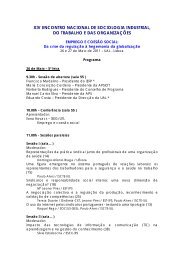Web-based Learning Solutions for Communities of Practice
Web-based Learning Solutions for Communities of Practice
Web-based Learning Solutions for Communities of Practice
You also want an ePaper? Increase the reach of your titles
YUMPU automatically turns print PDFs into web optimized ePapers that Google loves.
A Process-Oriented and Technology-Based Model <strong>of</strong> Virtual <strong>Communities</strong> <strong>of</strong> <strong>Practice</strong>s<br />
furthering their ‘practice’ or doing their work<br />
better.”(Allen, Evans, & Ure, 2005).<br />
CoPs typically involved people who where<br />
located in the same vicinity; to overcome the<br />
typical problems <strong>of</strong> the dispersion it is necessary<br />
to take advantage <strong>of</strong> the Internet technologies. As<br />
a consequence, a new typology <strong>of</strong> communities<br />
emerges: the Virtual <strong>Communities</strong> <strong>of</strong> <strong>Practice</strong>s<br />
(VCoPs). A VCoPs can be seen as a distributed<br />
community <strong>of</strong> practice, which refers to a group<br />
<strong>of</strong> geographically distributed individuals who are<br />
in<strong>for</strong>mally bound together by shared expertise and<br />
shared interests or work. Such individuals depend<br />
on in<strong>for</strong>mation and communication technologies<br />
to connect to each other (Daniel, Schwier, & Mc-<br />
Calla, 2003).<br />
Moreover, when adding “virtuality” to the<br />
concept <strong>of</strong> CoPs we mean, following the Cohen<br />
and Prusak’s definition (Cohen & Prusak, 2001),<br />
any work carried out over a distance <strong>of</strong> time<br />
and space, usually with the aid <strong>of</strong> electronic<br />
communication. Indeed, VCoPs are fostered<br />
by a blend <strong>of</strong> hardware and s<strong>of</strong>tware that allow<br />
people to communicate easily, immediately,<br />
universally, and inexpensively. But, virtuality<br />
represents a great challenge <strong>for</strong> the knowledge<br />
creation processes, because technology can not<br />
completely substitute face-to-face interactions. In<br />
this sense virtual communities will supplement,<br />
not supplant, traditional communities. Another<br />
meaningful way to con<br />
Be<strong>for</strong>e presenting the model <strong>of</strong> VCoPs that<br />
we propose in this work, we will discuss about<br />
some rising approaches in teaching and learning<br />
methodologies in Business Schools, by also<br />
providing a set <strong>of</strong> conditions which are common<br />
in the context <strong>of</strong> Business Schools and that we<br />
think they can be applied also in VCoPs.<br />
Emerging Approaches in <strong>Learning</strong><br />
Methodologies in Business Schools<br />
Emerging trends in teaching and learning approach<br />
in Business Schools sustain that learning<br />
occurs in in<strong>for</strong>mal exchanges and is largely <strong>based</strong><br />
on constructivism paradigms (Kowch & Schwier,<br />
1997). Constructivism paradigm provides a new<br />
way <strong>of</strong> looking the learning process, because it<br />
asserts that learners construct knowledge as they<br />
interact with the world, strive to make sense <strong>of</strong><br />
their experiences, and seek meaning. The teacher’s<br />
centered approach is substituted by the learner<br />
centered approach in which individuals are<br />
engaged in developing knowledge and cognitive<br />
models through a process <strong>of</strong> co-participation with<br />
others members in a shared learning community<br />
acting on a geographically dispersed basis. Learners<br />
become builders <strong>of</strong> facts in constructing contents<br />
<strong>of</strong> knowledge, rather than passive recipients<br />
<strong>of</strong> knowledge from the instructor. Consequently,<br />
learners should be engaged in active, constructive,<br />
authentic and cooperative learning (Jonassen,<br />
Davidson, Collins, Campbell, & Hag, 1995).<br />
Constructivists (Duffy & Jonassen, 1992,<br />
Barrows & Tamblyn, 1980) believe that the following<br />
four conditions must be met <strong>for</strong> learning<br />
to occur in Business Schools. We affirm that these<br />
conditions are met in VCoPs:<br />
• <strong>Learning</strong> must be embedded in complex,<br />
realistic, and relevant environments increasing<br />
the interaction among learners.<br />
The National Research Council emphasizes<br />
the importance <strong>of</strong> community in learning<br />
environments and upholds that learning<br />
environments should be a combination<br />
<strong>of</strong> learner-centered, knowledge-centered,<br />
assessment-centered, and community-centered<br />
environments (Brans<strong>for</strong>d, Brown, &<br />
Cocking, 1999). VCoPs provide opportunities<br />
<strong>for</strong> learners and researchers to interact<br />
with others, engaging learners in learning<br />
activities with peers. VCoPs members<br />
generate an increased in<strong>for</strong>mation flow<br />
and new ideas through interaction. These<br />
methods include: asking and answering<br />
questions, chatting with experts, problem<br />
solving, resource and in<strong>for</strong>mation sharing,<br />
251



